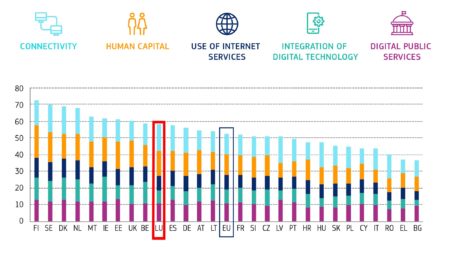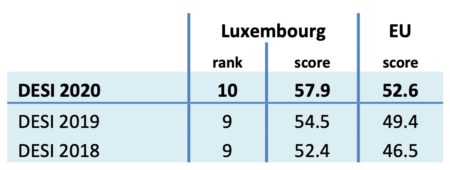유럽 DESI 지수: 룩셈부르크 10위
유럽위원회가 2014년부터 측정한 DESI(Digital Economic and Society Index)는 회원국들이 디지털 영역에서 어떤 진전을 보이고 있는지를 보여주는 좋은 지표다. 룩셈부르크는 유럽 평균을 훨씬 상회하고 있으며, 특히 연결 분야에서는 3위를 차지했다.
The Covid-19 pandemic has clearly demonstrated how crucial digital resources are for economies. The multiplication of teleworking solutions or the implementation of industrial digitisation processes to adapt production tools are two examples among others.
These developments are obviously not reflected in the latest figures of the Digital Economy and Society Index (DESI), published this week by the European Commission. Nevertheless, they are widely covered in specific chapters highlighting the very numerous measures put in place at all levels by Member States (including the UK for the last time).

THREE POINTS UP IN ONE YEAR
The podium in this 2020 Index (based on 2019 data) is occupied by Finland, Sweden and Denmark, which takes third place from the Netherlands.
 Luxembourg is ranked in 10th place, one place lower than in 2019. However, with a score of 57.9 points, the country has improved its previous score by more than three points and remains well above the European average (52.6).
Luxembourg is ranked in 10th place, one place lower than in 2019. However, with a score of 57.9 points, the country has improved its previous score by more than three points and remains well above the European average (52.6).
“Significant progress is observed on digital public services, rising two positions in the ranking, mainly thanks to digital public services for business and pre-filled online forms of public services,” the study analyses.
Luxembourg’s overall performance in the area of digital public services has even improved faster than the EU28 average and in the provision of digital public services to businesses, the country scores 99 out of 100 (compared to an EU28 average of 88).
CONNECTIVITY: ALWAYS HIGHER
The country is also moving up one place (now 3rd) in the connectivity rankings and is improving at a faster pace than the EU average. “The country is almost fully covered by fast fixed broadband networks and has also a very good coverage of very high capacity networks,” the report notes.
The text also mentions the fact that broadband services are slightly more affordable compared to the EU average (the price index including both fixed and mobile subscriptions and taking into account purchasing power parity).
Moreover, Luxembourg continues to be on track to meet the EU’s broadband targets.
Even though the 5G deployment was basically at a standstill at the end of 2019 – no radio frequencies in the bands concerned were yet available, as the first assignments are planned for the course of 2020 – the report has a positive outlook. DESI states that the “strategy to streamline permit procedures and to facilitate access to public property to extend and densify mobile networks would further stimulate and accelerate the roll-out of both fixed and mobile infrastructure”.
STRATEGIES TO ENHANCE E-SKILLS
On the other hand, although it remains above the EU average (58.2 compared to 49.3), the country fell one place (now 8th) in the human capital ranking. ” Luxembourg continues to implement a range of strategies and initiatives to boost the digital skills of its population and to attract and retain talent, to address the significant digital skills gap on the labour market,” the report notes.
The inclusion of code learning in the curricula of the 5th and 6th years of basic education, the Digital4Education strategy and the Artificial Intelligence (AI) strategy, which includes measures to encourage advanced digital skills, are cited.
The report also recalls that Luxembourg is one of the founding members of the European High Performance Computing (HPC) Joint Undertaking and will acquire the Meluxina supercomputer. In addition, that the year 2019 marked the launch of the first Digital Innovation Hub, designed to encourage the digital transformation of its industry, particularly SMEs.
KEY MEASURES IN RESPONSE TO COVID-19
The consequences of the Covid-19 crisis will obviously be closely studied and will probably upset the indicators of this DESI. The report mentions some of the key measures taken by Luxembourg to deal with the crisis, in particular:
- The implementation of teleconsultation platforms and applications allowing remote monitoring of all patients testing positive for COVID-19;
- The development of the Jobswitch platform to connect companies in need of manpower with those whose employees are unemployed, employees on short-time work and the self-employed;
- The launch of the epi-covid19.lu website to connect supply and demand for personal protective equipment;
- The creation of the e-commerce platform corona.letzshop.lu enabling local merchants to sell online, providing special support to vulnerable people by distributing essential food items;
- Strengthening digital communication tools to provide a wide range of distance learning and teaching solutions for primary and secondary school children;
- The intensification of digital public services via the “Guichet.lu” website, which has seen a sharp increase in demand.
“Looking forward, as regards the DESI indicators that are especially relevant for the economic recovery after the COVID-19 crisis, Luxembourg is very advanced in the deployment of Very High Capacity Network (VHCN) and is above EU average in the digital skills indicators,” notes the report
Source: https://www.tradeandinvest.lu/news/european-desi-index-luxembourg-in-10th-position/

